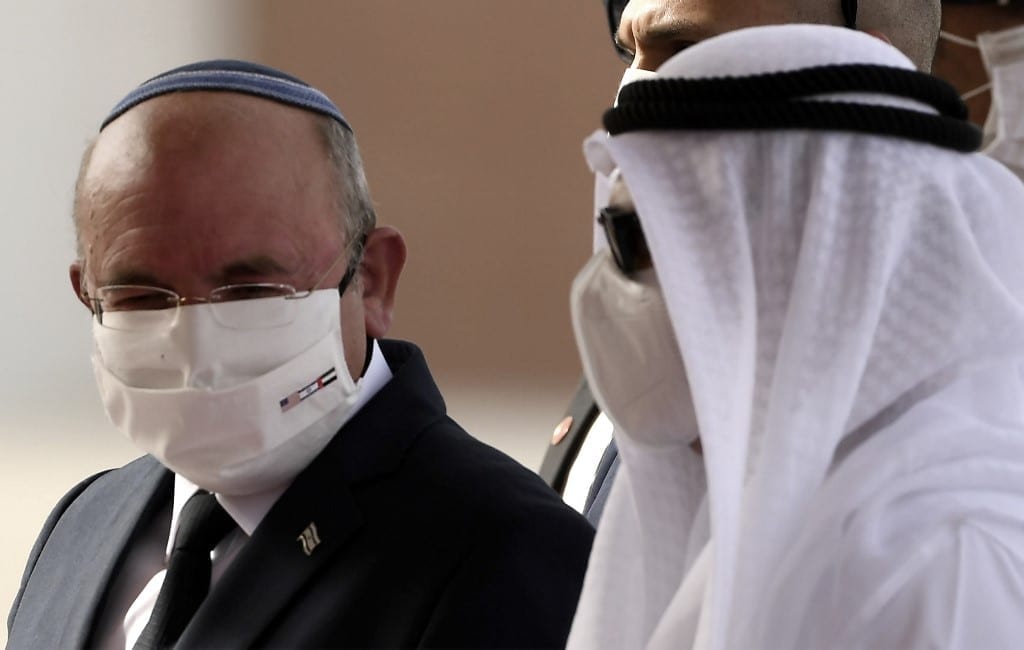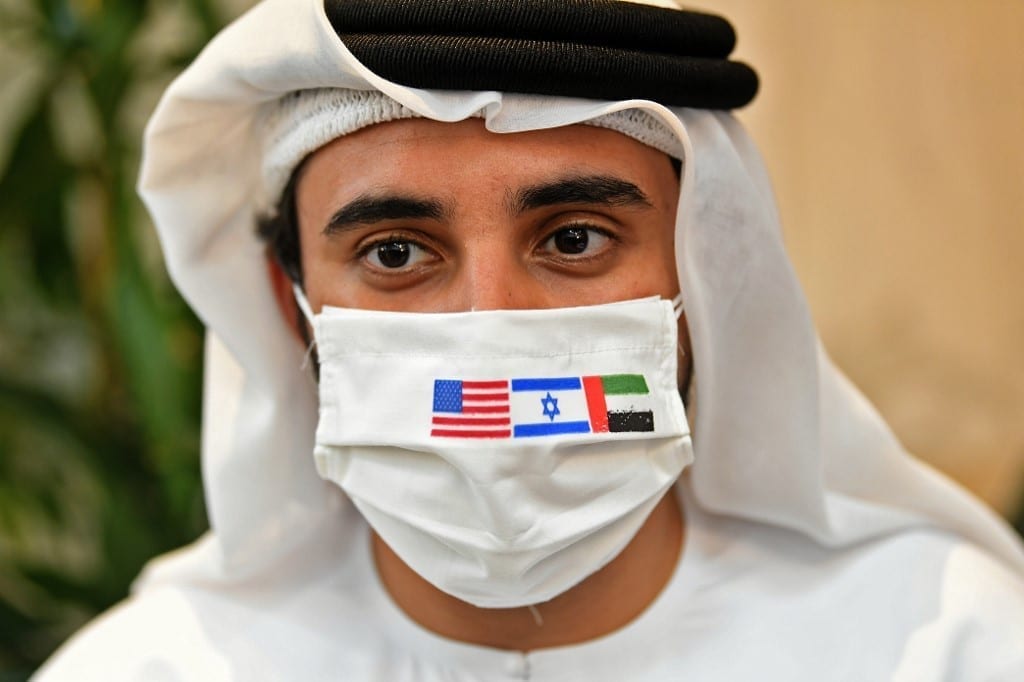Barak Ravid, Walla News Website reporter, has quoted an Israeli official saying that an Emirati official confided in him that the people in Abu Dhabi have the impression that they have become a “political football”, being passed between Israeli officials who only aim to gain public opinion support.
However, facts point out that the history of the UAE- Israel relations was based on the later’s interests, most notably through the role it has set for itself to influence the entire region, starting by the provision of services, the UAE’s need to obtain security and surveillance technologies to control the various aspects of Emiratis lives, spying on people in Arab countries, and those opposing the Emirati policies, and the UAE’s role in undermining Arab revolutions. Moreover, it is not a secret that the UAE hired numerous Israeli cyber espionage experts to develop the relevant technologies it needed.
As a result of the escalation of the dispute that followed Israel’s refusal of the US selling of F-35 jets to the UAE, and also in an attempt to show the public that the normalization agreement was not only about security cooperation, the security and economic delegations heading to the UAE were split, a short while before the visit. The US delegation was led by Trump’s advisor, Jared Kushner, accompanied by Robert O’Brien, the US National Security Advisor, while the Israeli delegation was led by Meir Ben Shabat, President of the National Security Council in Israel.
Furthermore, Israeli media outlets have highlighted that Israel has taken a decision to separate the political and economic talks from the security talks with the UAE officials and to postpone the visit of the Israeli security delegation to Abu Dhabi upon an American- Emirati request. American and Emirati officials were concerned that the presence of security officials as part of the Israeli delegation would drive the media to solely focus on the F-35 jets deal.

During the “historical visit” to Abu Dhabi as described by Netanyahu and Israeli media outlets, the Israeli-American meetings with Emirati officials focused on the normalization of relations between the UAE and Israel, cooperation in economic, civil and health fields, and the preparations for the signing of the peace accord in Washington on October 1st, 2020.
The aforementioned dissension arose due to a statement issued by Netanyahu’s office noting that “The historical peace accord between Israel and the UAE did not include any Israeli approval of an arms deal between the US and the UAE, in addition to the statements of Mike Pompeo, the US Secretary of State, who stressed, during a press conference, that there will not be any arms sale that might undermine the Israeli military advantage in the region.”
Nevertheless, even though Israel has publicly refused the US selling of F-35 jets to the UAE, Yedioth Ahronoth newspaper noted that “Israel had started supplying the UAE with advanced weapons in 2010 in an attempt to silence it after exposing the assassination of the Palestinian leader Mahmoud al-Mabhouh inside Al-Bustan hotel in Dubai ten years ago.”
Furthermore, Yedioth Ahronoth has reported that the political and security establishments in Israel discussed the US selling of F-35 jets to the UAE, and that other discussions took place between Netanyahu, the Mossad and the Israeli Defense Forces (IDF). The IDF is the only entity in Israel that strongly opposed this deal, for fear of leaking information about advanced Israeli and American devices to the enemies.
Nevertheless, despite the opposition of Israel to the US selling of F-35 jets to the UAE and that this might undermine the power balance as pointed out by several Israeli experts, Haim Tomer, former chief of the Intelligence Division in the Mossad, has noted during an interview with the Israeli Radio that: “Israel’s approval to the US selling of F-35 jets to the UAE should not pose any problems, especially that the accord with Abu Dhabi may be beneficial for Israel within the framework of other scenarios serving an Israeli-Iranian confrontation.” This highlights the Israeli interest in enlarging the scope of security cooperation with the UAE, that plays an important role in the region, serving its interests and those of Israel as well.


Before the American and Israeli delegations headed to the Emirates, the Israeli media painted an image showing that the Emiratis were more enthusiastic about the alliance and normalizing relations with Israel than the Israelis, and that the Emiratis emphasized that their intentions for peace were real. The “Yedioth Ahronoth” newspaper quoted an official in Abu Dhabi as saying: “We shall not be like Egypt, that maintains a cold peace with Israel, and we will not be like Jordan, which has embraced the Palestinian President Mahmoud Abbas’s position.”
“We should not forget the differences,” said Nahum Barnea, the chief political analyst at Yedioth Aharonoth. “Israel was established with the hard work of its citizens, their courage in the battlefield, and with the generosity of the Jewish people. Israel adopted rules of the democratic game before its birth, it was neither founded with oil revenues nor by foreign workers, therefore it could not adopt the Emirati model – one million wealthy citizens and 8 million foreign workers deprived of all rights, under a non-democratic system.”
Barnea also called on the Israelis “not to have unrealistic expectations for the hundreds of millions of dollars that will be pumped here directly from Dubai. Foreign investment is a sensitive issue, and any investment in infrastructure must be scrutinized for security implications.”
While the political correspondent for Ha’aretz, Noa Landau, pointed out that the Israelis treated the agreement with the UAE with indifference, even though they had all supported it. But she added that Israeli Prime Minister Benjamin Netanyahu, “as usual, takes this opportunity to challenge the left and claim that he has destroyed the basic claim of the Israeli peace camp that peace with the Arab world will only be achieved through making concessions to the Palestinians. Renouncing the annexation will not support his claim.”
“The fact that talking about a peace that was not preceded by a war, with a state with no direct borders with Israel, while everyone knew that there had been a branched relationship with it for many years in various fields, even though it was not public, all this reduces the aura that the parties of the agreement seek to portray,” Landau said.
The scrutiny of the text of the UAE-Israel peace agreement goes against what some analysts have said, “Starting direct relations between two of the Middle East’s most dynamic communities and developed economies will lead to changing the region (the Middle East) by stimulating economic growth, fostering technological innovation, and creating closer relations between people.”
The text of the agreement makes it clear that it was based on political, geopolitical and economic interests, and in its folds the Arab dependency is manifested through what is known as “promoting technological innovation” through Israeli technology, which comes within an Israeli military-security colonial context. Thus, it is important to understand the roots of the agreement and its political and economic importance.
The Israeli newspaper “The Marker” reported on August 19 that “the UAE is the first and most important customer of the group”. The report shows the strategic cooperation between the Israeli company and the UAE to spy on opponents, both inside and outside the UAE. A UAE spy agency called “Dark Matter” is related to this Israeli group.
Given the nature of the UAE-Israel alliance, the history of the two countries’ past relations must be understood, as it was centered around modern technology, in various Emirati civil, security and military facilities.
According to a recent Ha’aretz report, Israeli-UAE relations have been extended for more than two decades, and some 500 Israeli companies operate in the UAE. Cooperation between Israeli and UAE companies extends to a wide range of fields, in water, technology, agriculture, health, fintech services sector, advanced weapons, internal security and cyber security. These last two sectors are the main pillars of the alliance.
The Israeli newspaper “The Marker” reported on August 19 that “the UAE is the first and most important customer of the group”. The report shows the strategic cooperation between the Israeli company and the UAE to spy on opponents, both inside and outside the UAE.
A UAE spy agency called “Dark Matter” is related to this Israeli group, and a group of former “NSO” employees, all of them former experts and specialists in the 8200 Israeli Intelligence Unit.
In conclusion, the Israeli-UAE alliance is deeper than normalization of relations, and exchange of visits and tourism, as is the case with Israeli peace agreements with Egypt and Jordan, which Israel sees as positive-neutral agreements, the Israeli-UAE alliance depends mainly on a strategic dimension, exploiting the divisions and regional conflicts and the passage of a decade since the Arab revolutions, the political arrangements that must be made in accordance with the priorities of the Emirates’ interests, based on Israeli military and security technology, as well as Israeli investments, by opening new Arab markets and increasing technological, security, and military exports and services.
All this goes on without regard to the Arab interests and the Palestinian cause in particular. The only consideration is the extent of Israel’s control over the Arab region and its expansion in a settler-colonial context, increasing its investments and liquidating the Palestinian cause, and at the same time ensuring the fortification of the Emirati regime, its continued existence and internal stability through the possession of F-35 aircraft, in addition to precise and advanced weapons and technology.






